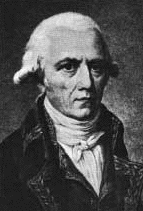August 1: Marquis de Lamarck
Marquis de Lamarck (1744)
It was on this date, August 1, 1744, that French botanist, zoologist, and natural philosopher Jean Baptiste Pierre Antoine de Monet de Lamarck was born in Picardy. The Marquis de Lamarck studied for a time at a Jesuit college, but abandoned that institution when he became a Deist and, after some time in the French Army, which he left on account of illness, Lamarck applied himself instead to science. In fact, he studied medicine, meteorology, and botany while supporting himself as a bank clerk in Paris.
His three-volume book on French flowers so impressed Buffon that the naturalist promoted Lamarck's work for years. He was elected to the Academy of Sciences in 1779. When the Museum of Natural History was reorganized in 1793, Lamarck (then age forty-nine) taught himself zoology to win a professorship. He lectured there from 1794 until blindness convinced him to retire in 1818. During that time, he published his famous work, Zoological Philosophy (1809), which proposed his Lamarckian theory of evolution: that organic changes are directly produced by the environment and transmitted; that is, the "inheritance of acquired characteristics." Lamarck was writing a work of philosophy, not of empirical research, and the theory has since been discredited. Still, Lamarck had prepared the way, philosophically, for acceptance of Charles Darwin's theory of evolution 50 years later.
And Darwin, Charles Lyell, Ernst Haeckel, and others acknowledged their debt to this bold step toward an evolutionary theory. Darwin wrote in 1861:
Lamarck was the first man whose conclusions on the subject excited much attention. ... This justly-celebrated naturalist ... upholds the doctrine that species, including man, are descended from other species. He first did the eminent service of arousing attention to the probability of all change in the organic, as well as in the inorganic world, being the result of law, and not of miraculous interposition.*
Lamarck's articulation of the theory that organisms evolved from less complex to more complex never caught on with the scientists of his time; but for his notice from some later evolutionists, he might not be remembered at all. And even Darwin had believed acquired characteristics could be inherited.
Curiously, the Catholic Encyclopedia claims Lamarck, saying he was "not a materialist; he was also neither an atheist, nor irreligious, nor an opponent of the Scriptures. On the contrary, in regard to the creation of man he frankly placed the authority of the Bible higher than his own ideas." All this could be true, except for the part about opposing the Scriptures: at the time Lamarck was writing, no Catholic was allowed to be an evolutionist. It is curious, as well, that the pinnacle of Roman Catholic scholarship cannot quote one word from Lamarck's mouth attesting to his faith in Jesus or his expectation of immortality. As Lamarck put it, "Life is a purely physical phenomenon."
And Armand de Quatrefages, writing after careful study of his views in 1894, declares that Lamarck was "essentially Deistic."** In a work published the year after his death, Lamarck himself takes a methodologically naturalist view, saying, that spiritual realities are unknowable, since "all knowledge that is not the genuine product of observation or of consequences deduced from observation is entirely groundless and illusory."† He may have been an Agnostic. At most, when the Chevalier de Lamarck died at age 85, in Paris, on 18 December 1829, he was a Deist.
* Outline in On the Origin of Species, 3rd edition, "An Historical Sketch of the Progress of Opinion on the Origin of Species," 1861.
** Émules de Darwin, 1894, I, 12.
† Système analytique des connaissances positives de l'homme, 1830, p.84.
Originally published August 2003 by Ronald Bruce Meyer.


